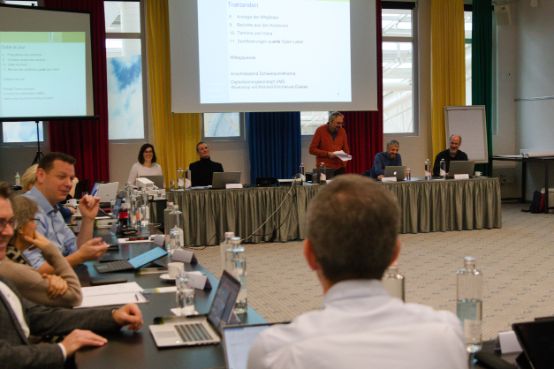Caro Felix, puoi darci un'idea della tua vita quotidiana?
(ride) Se c'è qualcosa che non esiste nella mia vita è la quotidianità ... Viaggio, provo, suono e ogni giorno è molto diverso.
Ci sono piccoli rituali che ti aiutano?
No, niente affatto. Cerco di rendere la mia vita il più semplice possibile. Not even if you start to create rituals or dinamiches, then you'll be right that something could come to an end. Even in very difficult circumstances, which I have seen very often, it is still necessary to be able to succeed. I rituali possono costituire un ostacolo: se decido di mangiare una banana prima di ogni concerto, o di fare un sonnellino prima del concerto, e poi il volo è in ritardo o non trovo niente da mangiare, a quel punto mi si scombussola tutto. Ecco perché cerco di rimanere il più flessibile possibile.
È un punto di vista interessante. Come fai allora con il tuo strumento - sicuramente devi esercitarti tutti i giorni?
Dovrei trascorrere circa tre ore al giorno con lo strumento, che di primo acchito non sembra molto. But sometimes it's difficult to find this time. A few months ago I was on an airplane in Messico and my corn support was blocked in Paris. I couldn't practise for four days, and then I had to do the tests - but then I had to play the concerts. Sapevo che mi rimaneva solo un giorno per prepararmi, e allora ho cercato di sfruttare questo tempo nel modo più efficace possibile.
Neanche una cosa del genere ti stressa?
Cerco di affrontare la maggior parte degli scenari possibili della vita. E penso che questo sia uno di quelli. Se riesci ad affrontarlo, molte cose diventano più facili. Se riesci a immaginare la gamma più ampia di possibilità, riesci a superare più facilmente le situazioni difficili e sei più flessibile.
Ma con il tuo strumento non sei stato per niente flessibile. Sapevi fin da bambino che sarebbe stato il corno. Perché proprio il corno?
All'epoca avevo quattro anni e ho espresso ai miei genitori il desiderio di imparare a suonare il corno - e loro non sapevano neanche che cosa fosse. Soì hanno contattato la scuola di musica di Göttingen, dove sono cresciuto, per vedere se c'era un insegnante di corno. Questi ha detto, mio Dio, allora proviamoci. Da dove sia venuta il mio desidero per il corno, non lo so. Non è stato a un concerto, non ho incontrato nessun cornista. È ancora oggi un mistero per me.
Ci sono stati momenti in cui hai pensato che sarebbe stato meglio scegliere uno strumento diverso?
No, in realtà no. E poi io non volevo fare musica o carriera, volevo solo suonare il corno. Semplicemente questo.
Probabilmente sei stato un allievo di musica modello: sapevi cosa volevi ed eri disposto a investire molto. Avevi anche una volontà di ferro.
Non ho frequentato molto la scuola di musica, all'età di 12 anni sono passato alla scuola universitaria. But I was nothing more than an allievo modello, I believe (ride). Non sono mai stato quello che faceva le cose che pretendevano da me. Quando l'insegnante mi diceva qualcosa, provavo e cercavo di capire se andasse bene per me oppure no, e se non andava bene non lo facevo. Per gli insegnanti, era spesso una situazione molto difficile.
Ci sono stati insegnanti che ti hanno detto - ehi, sono io l'esperto qui?
Sì certo. My way of thinking and solving problems did not go well with the school system, where it is a process that needs to be done, and whoever completes it does it in the right way. At university, the atmosphere was much more relaxed, also due to the fact that a university professor is very successful - and in order to be successful, you don't have to imitate, but you have to be able to understand and teach others.
Hai mai avuto dubbi sul fatto che tu stessi facendo la cosa giusta?
Certamente. I dubbi sono la ragione principale per cui si fa qualcosa. Se non si hanno mai dubbi, allora si rimane seduti sul divano. A very concrete example: when I was about fourteen years old, I realized that I was totally relaxed when I was studying in the house, but I felt very uneasy and nervous when I left my parents' house. Improvvisamente ho scoperto che questo nervosismo non aveva nulla a che fare con la paura del palcoscenico, ma piuttosto che a casa suonavo solo in stanze con il pavimento di moquette. Soì ho iniziato a suonare in stanze senza moquette, in bagno e in cantina. In these places you can't even breathe, the sound is terrible and incredibly rumorous, and at the beginning I had a lot of difficulty because it was really the environment that I didn't like. But after a while the situation stabilized. Oggi so che posso suonare ovunque, anche nella stanza più brutta con l'acustica più terribile. Molti sono dell'idea che si dovrebbe suonare solamente in una buona acustica. Io dico: se ti senti a tuo agio nella situazione più terribile, allora funziona ovunque. Ho solo seguito la mia strada, il mio percorso.
Il mondo dell'educazione musicale si sta esaurendo - in realtà, uno vorrebbe avere degli allievi come te. Vorrebbe prenderli sul serio, considerarli individualmente. But you have done this in a very different way.
Penso che la musica sia semplicemente importante: il 99,9999%, e molti altri 9 a seguire, di persone imparano uno strumento perché dà loro gioia. È così che dovrebbe essere. La musica dovrebbe essere divertente, bisogna sentirsi a proprio agio, vivere un'esperienza insieme. Pochissimi diventano professionisti, e quindi non bisognerebbe voler creare perfezionisti, altrimenti si consegue solo che i bambini perdano la voglia di continuare. Proviamo a immaginare, se ogni volta che che dei bambini giocano a calcio per strada cerchiamo di migliorare la loro tecnica - perderebbero in poco tempo l'entusiasmo e smetterebbero di giocare.
Insegni anche alla scuola universitaria di musica?
Alla scuola universitaria di Münster. Solo parzialmente, non sarei in grado di creare una cattedra intera al momento, altrimenti dovrei ridurre il calendario dei concerti. È molto divertente per me. Vedere diversi modi di vivere, insegnare alle persone, è molto eccitante.
Cosa vorresti raggiungere come docente universitario? Hai un obiettivo?
Cerco di trasferire agli studenti quello che mi ha aiutato nella vita - il pensiero che si discosta dalla norma. Il 95% di ciò che bisogna fare come musicista avviene nella propria testa. L'abilità, l'attitudine di essere liberi nella testa. Quante volte si suona qualcosa e poi si giudica se stessi, che non andava bene, che non funzionava. Questo porta ad una limitazione nella testa. Abbiamo una grande volontà a nostra disposizione, ma spesso restiamo chiusi in uno stanzino. Se dici a qualcuno che suona molto bene ma non è fatto per il palcoscenico perché è nervoso, gli dai il colpo di grazia. But if, on the other hand, the people who all know nervosismo, which is part of the game, don't want to fight it but face it, then it is completely different. Quindi si può provare a fare esperienze positive. Altri non hanno problemi, suonano e basta. Riuscire a capire come sono le persone, cosa vogliono, che cosa hanno vissuto - è lì che vedo il mio compito. Where, at the end, I want to help people.
E cosa vuoi raggiungere come cornista?
Naturalmente, questa è una domanda a cui non posso rispondere. A very big question. Quello che sto facendo in questo momento, non avrei mai pensato di poterlo fare. To be able to live as a soloist and travel all over the world - as a child I never imagined it, because it was so unrealistic. Pensavo più ad una posizione in una buona orchestra, sarebbe fantastico. This pensiero del vincitore, come lo chiamo io - se corro abbastanza veloce, divento un campione olimpico - non ce l'ho più. Or forse non l'ho mai avuto. Penso che sia bello rendere felici le persone con la musica, è quello che mi piace, quello che mi affascina.
Allora non sei un fuggitivo e sei semplicemente felice di ciò che arriva dalla vita.
Esattamente. Se si riesce ad essere completamente indipendenti da ciò che si fa - non deve essere musica, può essere in qualsiasi professione, o nella vita familiare - per essere in pace con ciò che si ha, non bisogna necessariamente cercare di continuo di avere successo. Se pensi più di non aver raccolto abbastanza successi, di dover mostrare al mondo ciò che vali. Se sei in pace con te stesso, non hai più bisogno di questo.
Felix Klieser verrà in Svizzera il 21 gennaio - terrà una presentazione al Forum formazione musicale di Baden. Il suo sito web dà un'idea del suo variegato calendario dei concerti.
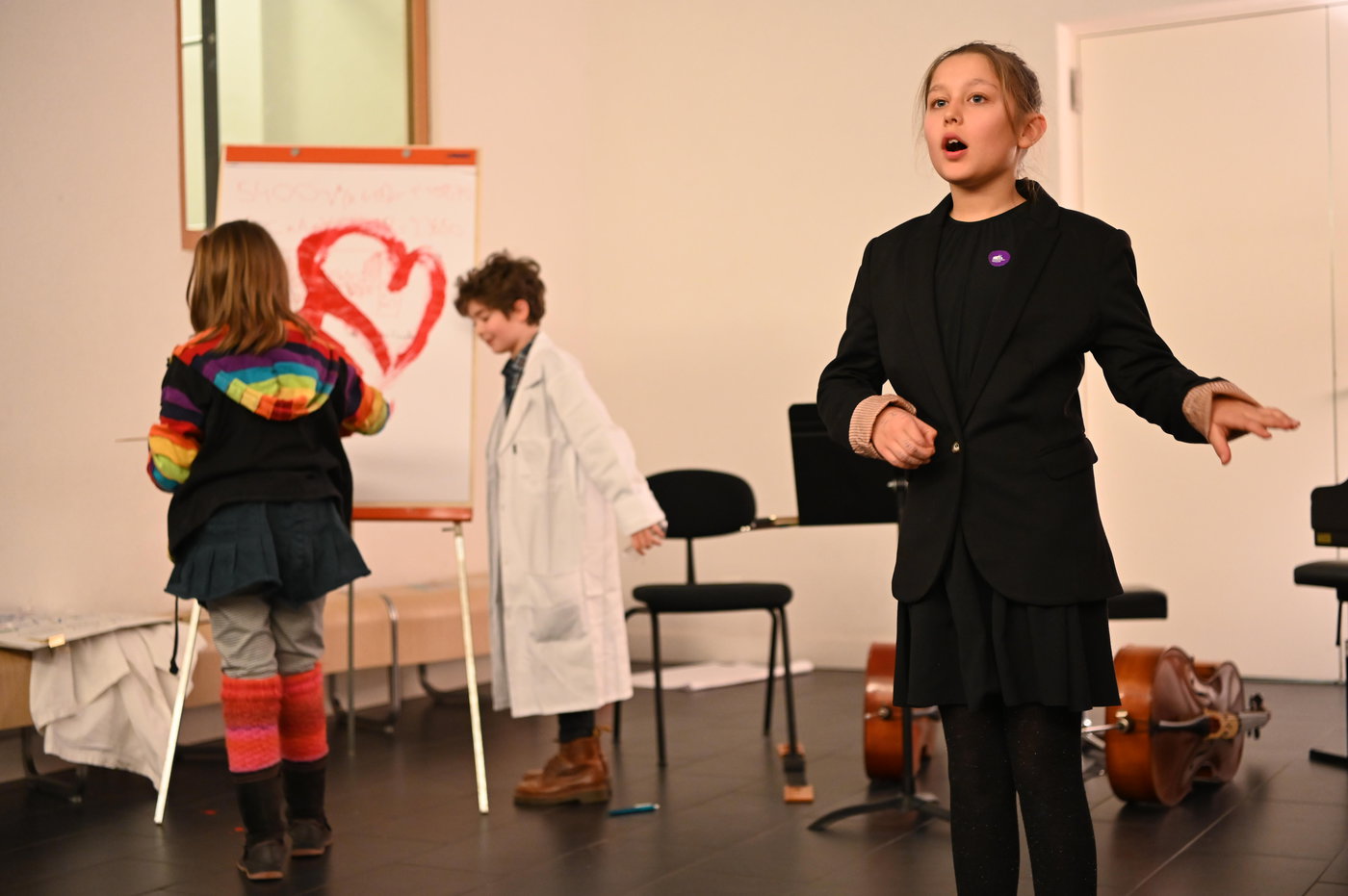 "The project stems from the desire for music schools to be as accessible as possible," explains Eugénie Grenier Borel, the initiator of the project. The course therefore takes place on site directly after school, which makes it much easier for parents to coordinate their daily lives. The course takes place weekly, lasts two hours and is led by three instrumental teachers and a drama teacher. The aim of the course is to put on a show at the end of the year.
"The project stems from the desire for music schools to be as accessible as possible," explains Eugénie Grenier Borel, the initiator of the project. The course therefore takes place on site directly after school, which makes it much easier for parents to coordinate their daily lives. The course takes place weekly, lasts two hours and is led by three instrumental teachers and a drama teacher. The aim of the course is to put on a show at the end of the year.





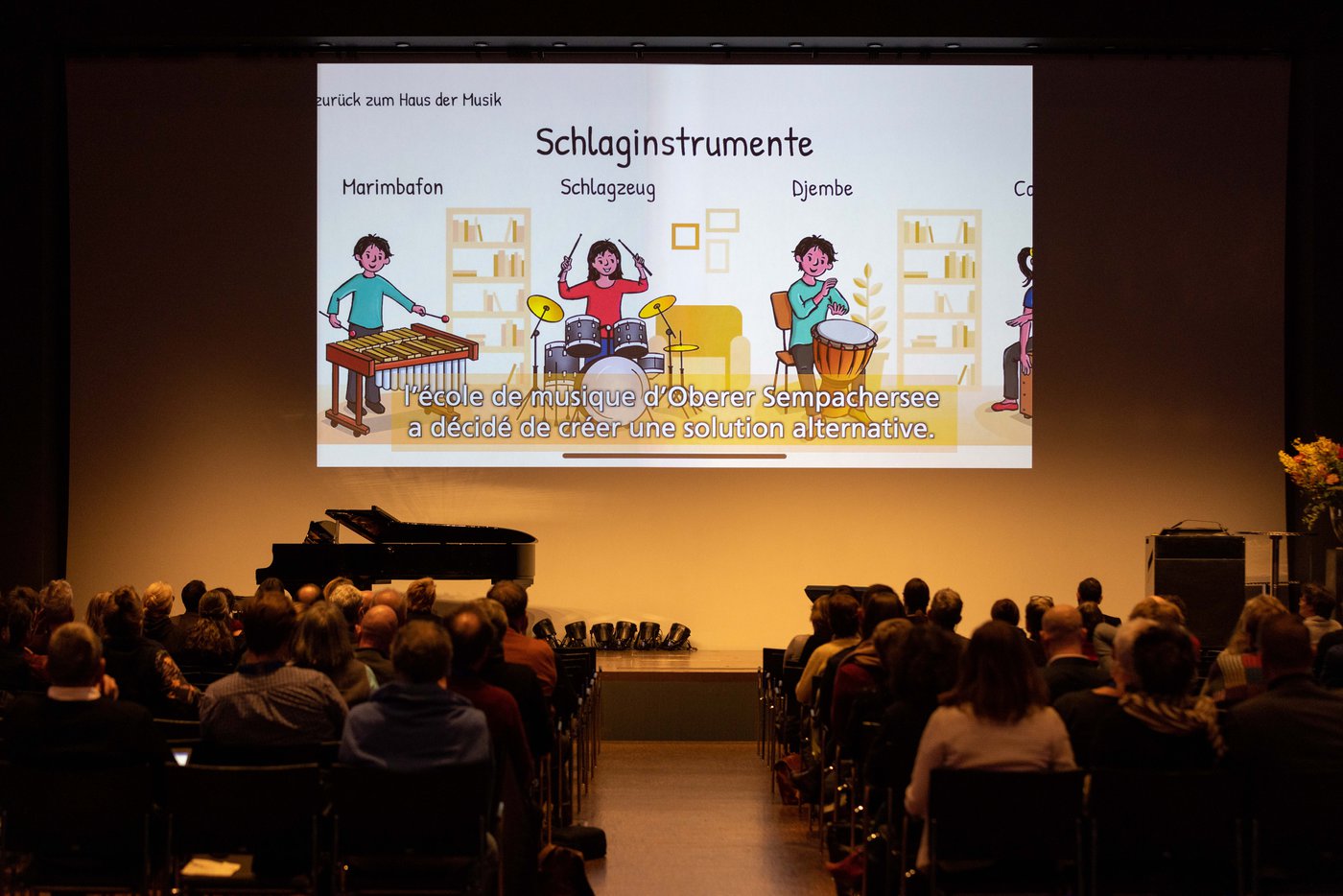
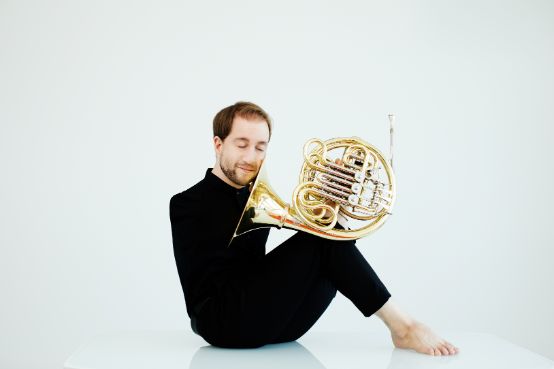
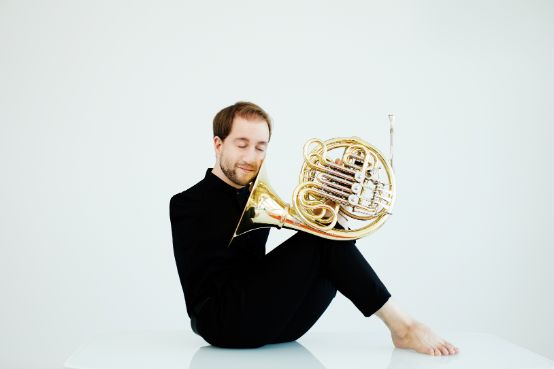
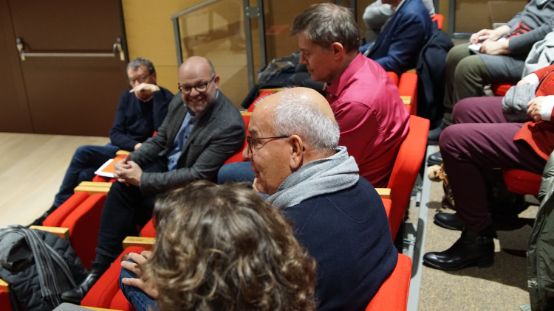
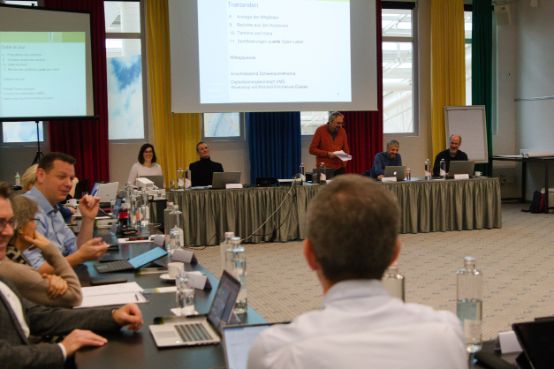
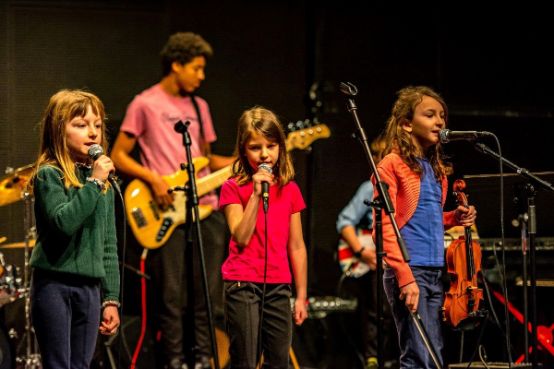
 Amadé Schnyder, VMS delegate for the canton of Valais
Amadé Schnyder, VMS delegate for the canton of Valais